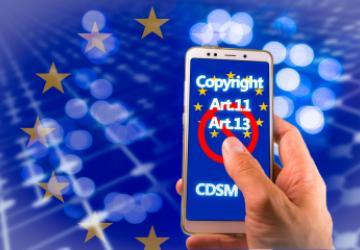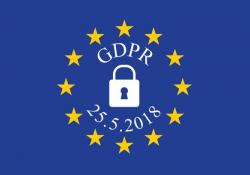Online Censorship Is Coming--Here's How to Stop It

EU's upload filters are coming. Why and how the Open Source world must fight them.
A year ago, I warned about some terrible copyright legislation being drawn up in the EU that would have major adverse effects on the Open Source world. Its most problematic provision would force many for-profit sites operating in the EU to use algorithmic filters to block the upload of unauthorized material by users. As a result of an unprecedented campaign of misinformation, smears and outright lies, supporters managed to convince/trick enough Members of the European Parliament (MEPs) to vote in favour of the the new Copyright Directive, including the deeply flawed upload filters.
A number of changes were made from the original proposals that I discussed last year. Most important, "open source software development and sharing platforms" are explicitly excluded from the scope of the requirement to filter uploads. However, it would be naïve to assume that the Copyright Directive is now acceptable, and that free software will be unaffected.
Open source and the open internet have a symbiotic relationship—each has fed constantly into the other. The upload filters are a direct attack on the open internet, turning it into a permissioned online space. They will create a censorship system that past experience shows is bound to be abused by companies and governments alike to block legitimate material. It would be a mistake of the highest order for the Open Source community to shrug its shoulders and say: "we're okay—not our problem." The upload filters are most definitely the problem of everyone who cares about the open and healthy internet, and about freedom of speech. For example, the GitHub blog points out that false positives are likely to be a problem when upload filters are implemented—regardless of nominal "exemptions" for open source: "When a filter catches a false positive and dependencies disappear, this not only breaks projects—it cuts into software developers' rights as copyright holders too."
So, what can be done?
As the Pirate MEP Julia Reda emphasises in her post summarizing the multi-year battle to improve the text of the Copyright Directive: "My message to all who took part in this movement: Be proud of how far we came together! We've proven that organised citizens can make an impact—even if we didn't manage to kill the whole bill in the end. So don't despair!" Specifically:
A novel alliance of digital rights NGOs, political parties and social media personalities succeeded in politicising and mobilising an entire generation of digital natives. Countless people rose to new challenges: Entertainment YouTubers suddenly found themselves in the role of reporters or political commentators, internet users became activists and organisers, and many participated in the first protests of their lives. These experiences will leave a lasting impact.
That's important, because the concerns and beliefs of that "novel alliance" are closely aligned with those of the Free Software community. The new-found interest in hitherto obscure aspects of the online world and its software are an opportunity for the Open Source world to increase awareness of what it does, and to garner support for its activities. The potential for spreading the word is huge: over five million people signed an EU petition against upload filters, and 200,000 took to the streets to protest. Where new digital rights initiatives are set up to harness the recent mobilization of "digital natives", free software coders can help people understand that open source is a key part of the solution to the problems they seek to address.
Another option is for the community to become involved in the next stage of the fight against upload filters. The legislation just passed by the EU is what is known as a directive; as such, it must be transposed into national law in all the EU's Member States during the next two years. Exactly how that is done, and what the result is, depends on the local legislative process and debate. There is plenty of scope for local variations in the laws implementing the Copyright Directive. This means there will be numerous local battles where open-source organizations can help to blunt the worst aspects of the new law.
Once local transpositions exist, it will be possible to begin the process of challenging upload filters as being inconsistent with existing EU law. There are a number of ways of doing that. When the time comes, the Free Software world can help encourage people to defray the considerable costs of doing so.
Assuming the worst, and that the upload filters survive legal challenges and are widely implemented, there is one final role that open source can—and arguably must—play. The EU Copyright Directive was a deeply dishonest piece of legislation, because it pretended to be about helping artists—a laudable aim. But it was really about attacking Google and, to a lesser extent, Facebook. Its main intent is to force them to pay EU publishers and recording companies, essentially as a punishment for thriving, while the traditional copyright industry is not, largely because of the latter's refusal to embrace fully the digital world and its new possibilities. The EU Copyright Directive is a misguided attempt to turn back the clock and make the internet a tightly controlled, passive medium like television.
In the coming world of the EU Copyright Directive, only big players can afford to participate. The new law will require the licensing of huge quantities of material, and the implementation of complex (and fallible) upload filters to block everything else. Both will be punitively expensive for smaller EU companies. Media power will be concentrated in the hands of the main copyright players, which will emerge as the gatekeepers and censors in this highly centralized system. A powerful way to fight upload filters and their threat to freedom of speech is to create internet services that are outside this framework—specifically, those that are completely distributed. Eben Moglen, General Counsel of the Free Software Foundation for 13 years, and co-creator of the most recent versions of the GNU GPL, understood this ten years ago. Here's what he said when I interviewed him on the subject in 2010:
What I am proposing is that we build a social networking stack based around the existing free software we have, which is pretty much the same existing free software the server-side social networking stacks are built on; and we provide ourselves with an appliance which contains a free distribution everybody can make as much of as they want, and cheap hardware of a type which is going to take over the world whether we do it or we don't, because it's so attractive a form factor and function, at the price.
He set up the FreedomBox project to realize that vision. It has been running since 2011, and it has created that "social networking stack" for various single-board computers. Recently, the FreedomBox Foundation launched a plug-and-play commercial version costing 82 euros, widening the reach of the project to non-technical users.
For years, the FreedomBox has been an important if little-known project. Today, in the wake of the disastrous EU Copyright Directive, it is indispensable. Although much good work has already been done by the dedicated FreedomBox coders, key software elements still are missing, and existing programs could be improved. As well as helping to create an alternative to the non-open, filtered internet that is coming to the EU, the FreedomBox initiative will move us closer to creating a more resilient global internet that is censorship-resistant. It should become a priority for the Open Source community.











